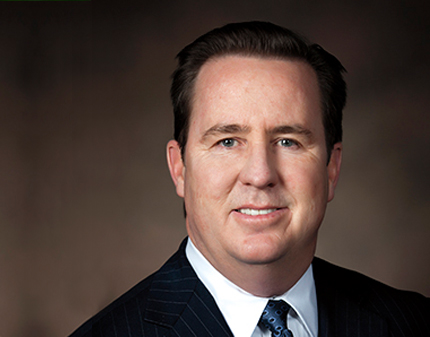Alumni Profile: The Benefits of Venturing Further Afield
By: Jeremy Simon | Originally posted on McCombs Today
 Chesapeake Energy’s Senior Vice President of Accounting, Mike Johnson, BBA ’87, sees the benefit in stepping outside your comfort zone.
Chesapeake Energy’s Senior Vice President of Accounting, Mike Johnson, BBA ’87, sees the benefit in stepping outside your comfort zone.
Although Johnson majored in accounting, he points to some non-business classes as among the most memorable from his time at The University of Texas at Austin. That willingness to challenge himself has continued during his professional career. After working in Texas following his graduation, Johnson took the chance on a “special adventure” and spent two years in Siberia
We spoke to Johnson about how McCombs School of Business helped prepare him for career success, his experience in Russia, and the benefit of varied academic studies.
How did McCombs prepare you for a career in the energy sector?
McCombs is a scholastic melting pot of the best and brightest young minds in business, and its highly competitive environment inspires its students to achieve excellence in everything they do. As somebody who, following graduation, has worked in-state (Houston), out-of-country (Russia), and out-of-state (Oklahoma City), being a graduate of McCombs speaks volumes about my training and has provided an unbeatable foundation for continued growth in my career.
Can you tell me a little more about your experience living and working in Russia? How would you describe that experience?
My two years in the Western Siberian section of Russia (1991-1993) was an outstanding experience for me. As I was considering leaving the Houston office of Arthur Andersen, I was looking for a special adventure that would [enhance] my career development. I found exactly what I was looking for in the otherwise desolate oilfields of Siberia. When I initially arrived in Moscow en route to a small city called Raduzhny, Mikhail Gorbachev was President of the Soviet Union and the red flag, along with the familiar hammer and sickle, was still at the top of every flagpole. A few weeks later, Boris Yeltsin ascended to power via a coup, and the Soviet Union began dissolving. Perhaps the most notable memory I have of this two year period was the quality and competence of the individuals that I met from various republics that comprised the former USSR. Generally speaking, most everybody that I met was exceptionally well-educated, fair-minded, and truly interested in learning more about our culture. It was an unforgettable experience.
What are some of the most memorable classes or professors from your time at UT?
Although I majored in accounting (which has served me well throughout my entire career), my most memorable fields of study were philosophy and psychology. In addition to focusing my studies in areas that I thought would allow me to be successful anywhere in business, I was equally interested in liberal arts-type courses that really challenged me to open up my mind.
What role have those philosophy and psychology classes played in your career or life overall?
I believe these areas of study have helped improve my understanding of people’s behavior, motivations, value systems, etc.
I particularly enjoyed studying logic as well. I’ve found that a broad understanding of these areas has been very useful to me as part of my daily interaction with others, both in business and life in general.
What has been the biggest challenge professionally since graduation? How did you overcome that challenge?
I’ve been lucky to have a senior role in a public company for many years, but along with that comes a great deal of personal responsibility. I’ve had the opportunity to work extensively on numerous complex regulatory matters and lawsuits. These challenges can sometimes be daunting. But all of this is made much easier when you feel strongly that you’ve always done the right thing.
What advice can you offer to current McCombs students seeking to follow a similar career path to yours?
Achieving success in today’s environment requires individuals to have diversified skill sets that are adaptable to changing business and market conditions. To the extent possible, don’t limit yourself to one field of study and try to be passionate about all that you do. It is also important to recognize that a career is built over time, and you should not expect to achieve all of your dreams before you turn 30.


Leave a Reply